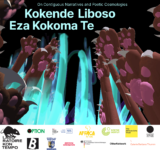“Fashizblack Magazine is the result of a rather peculiar editorial policy: we are neither an ‘ethnic’ magazine closed up on itself, nor a magazine dedicated to Western fashion in the traditional sense of the expression.” Paola-Audrey Ndengue
Interviewed by Dzekashu MacViban
Translated by Nfor Edwin N.
Fashizblack(Fashion Is Black) is a contemporary fashion magazine which focuses on Africa and the Black Diaspora. Created in 2007 by Cameroonians in France, it was originally an on-line magazine and became a print magazine in January 2012. Below is an interview with Paola-Audrey Ndengue, the Editor in Chief. According to Krystal Franklin “The magazine is rapidly becoming the fashion guide for the urban, young and smart black diaspora. With both French and English versions, FashizBlack has solidified a cult following with its stunning editorial spreads and compelling editorials.”
In this interview, Paola discusses the evolution of Fashizblack as well as its focus on the black diaspora and the role of the social media with Dzekashu MacViban.
Dzekashu MacViban: Can you tell us about the Fashizblack team and how the magazine started?
Paola-Audrey Ndengue: Fashizblack started as a fashion blog on the internet. Then it evolved into a website and, later, it became an on-line magazine accompanied by a blog which was updated a couple of times per day. The Fashizblack team is made up of 10 members (who are mostly editors and graphic artists) including a press attaché. The management, on its part, is made up of Laura Eboa Songue, Patrick Privat and myself.
What challenges did you face in the beginning, and how different are things now?
We faced various types of challenges. For example, when the magazine was still published on-line exclusively, we had to visit the website on a permanent basis, and improve the quality of the content with each issue. Also, we obviously had to win over advertisers. However, now that we have come to print versions of the magazine, we have much more room for manoeuvre. Nonetheless, we are dealing with a completely different readership now which also has to be won over, and this new readership does not know the magazine’s genesis. This, of course, also implies constraints at the level of logistics and production for example, thus ushering in a different type of pressure. We are in a completely different domain now, so the challenges we face are definitely not be the same.

You have come a long way from an on-line magazine to a print magazine, why the transition, and how influential was Kickstarter?
We launched the print version of this magazine because we lay emphasis on progress, and we have had 4 years to (unconsciously) prepare ourselves for this leap. Kickstarter conditioned almost everything: it enabled us to set off without having to get loans or such.
How different is Fashizblack from other fashion magazines?
The Fashizblack Magazine is the result of a rather peculiar editorial policy: we are neither an “ethnic” magazine closed up on itself, nor a magazine dedicated to Western fashion in the traditional sense of the expression.

Fashizblack’s focus is on the potential of Africa and the Black Diaspora, which is not the case with other major magazines; how would you explain the reluctance of the occident to acknowledge the fact that it is no longer at the centre of culture, a phenomenon Jacques Derrida refers to as the ‘decentring’ of our intellectual universe such that the universe we live in is ‘decentred’ or inherently relativistic.
I think one can actually say that the West is progressively losing its grip on world culture. Western codes and values, of course, are still very present, but I think that there are emerging alternatives to these. From what I have seen in many African countries, there is an important manifestation of a will to celebrate local cultures and traditions. What explanation can be given for this? It is very complicated. I think education and economic development in the said countries are key factors in the emergence of this trend. Most of these African countries are still very young, and this decentralising phenomenon can be experienced differently in each of them. This trend could also be affected by the way in which (de)colonisation was carried out in each of these countries (either following the British or the French policies).

How influential has the social media been in getting you a global audience?
As of now, that is not easy to determine. However, social media plays a very important role, especially at the level of efficiency when it comes to spreading information which has to be rebroadcast various times. Social media are also a good communication tool given that we use them to stay in touch with important professional relations living in different countries abroad.
How would you like Fashizblack to be remembered?
I would like Fashizblack to be remembered as a pioneer in this mode of publishing, but most especially for its global vision on fashion.
You were recently in Cameroon after a long time in Paris; what impression do you have of Cameroon, and is it different from the impression you had when you left?
Actually, I travel to Cameroon rather frequently (at least once every two years at worst). Generally, I think the country is stricken with inertia at many levels, even if some (usually isolated) initiatives may give a contrary illusion. I have met people willing to innovate, and others who are making things progress. However, this progress is rather slow compared to the country’s potential. Consequently, I am very reserved on the issue for the moment.








interesting site. i’ve visited couple of pages & found it interesting. lista de email lista de email lista de email lista de email lista de email